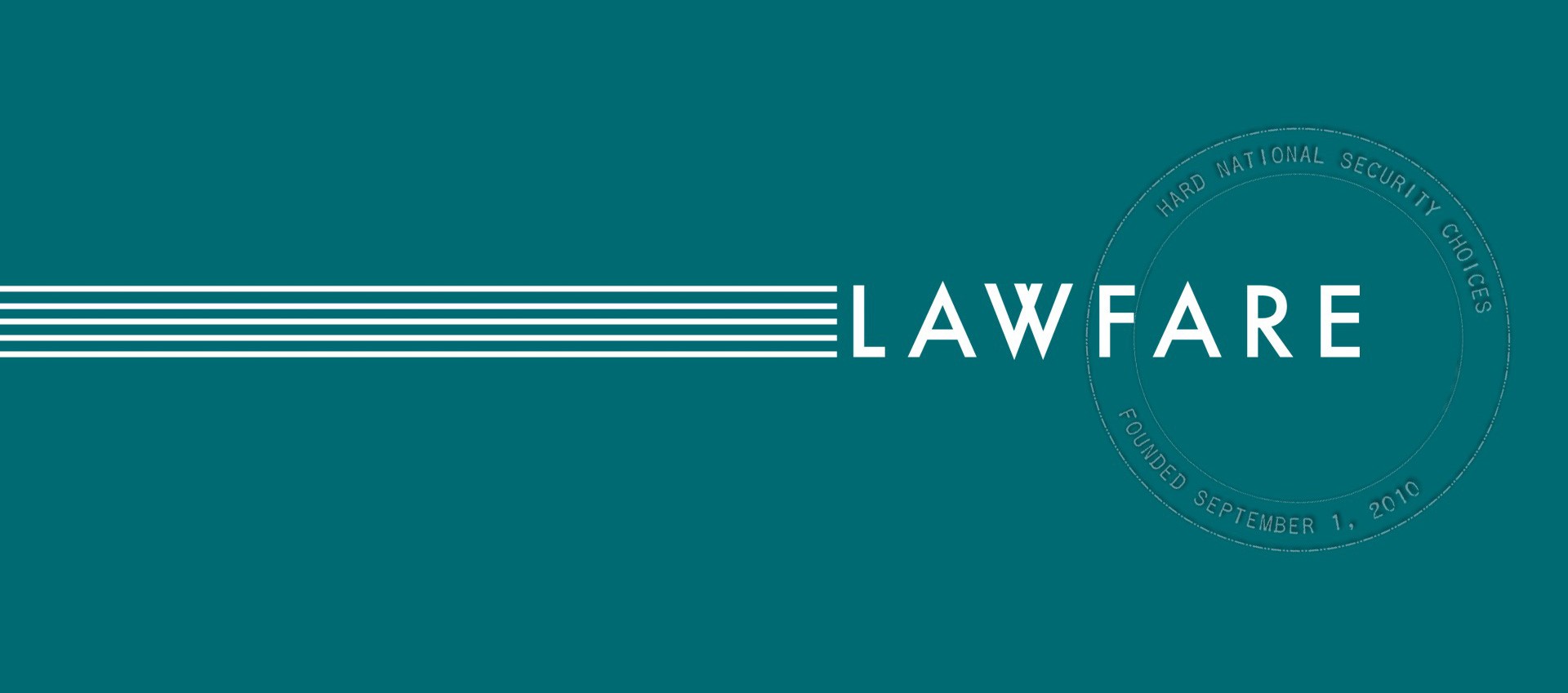Today on Lawfare
The latest on Lawfare, Sept. 22, 2022.

Published by The Lawfare Institute
in Cooperation With

Subscribe to receive this newsletter directly to your inbox.
Articles
Two Americas: Cross-Border Data Requests Post-Dobbs
Aaron R. Cooper argues that cross-border data requests between states for abortion-related investigations may start to resemble cross-border requests between countries and trigger new conflicts of law following the Supreme Court’s June ruling in Dobbs v. Jackson Women’s Health Organization.
State law can constrain data requests for abortion-related investigations because the CSPs that control the data are often incorporated or physically located outside the border of the requesting state, and demands made of those CSPs therefore implicate another state’s jurisdiction. Some states, at least historically, have honored these out-of-state (or “foreign” state) requests, either adopting interstate domestication procedures to facilitate cross-border service and enforcement of criminal or civil process or, in some cases, even obligating in-state entities to produce data as if the request were issued under the receiving state’s law. This kind of approach to cross-border demands may make sense in a world where states fundamentally agree on what conduct is criminal. But, following Dobbs, that baseline agreement no longer exists. Instead, there is now a looming specter of evidentiary demands from a state that prohibits abortion (the “criminalizing state”), for an investigation into conduct that is not criminalized by—and perhaps is specifically protected by the public policy, law, and/or constitution of—a state where the data subject, the information, or the provider controlling that information is located (the “protective state”). In this regard, the post-Dobbs world presents an unprecedented scenario for the collection of electronic evidence across state lines, where the compulsory process issued by one state threatens or violates fundamental rights protected in another.
Content Moderation Tools to Stop Extremism
In the latest installment of Lawfare’s Digital Social Contract paper series, Dan Byman presents content moderation options for technology companies, discussing how they work in practice, their advantages, and their limits and risks.
Tensions and new problems will emerge from these efforts. The question of censoring speech will remain even if certain content remains up but is not amplified or is otherwise seen as limited. Companies also have incentives to remove too much content (and, in rarer cases, too little) to avoid criticism. Process transparency, a weakness for most companies, remains vital and should be greatly expanded so that users, lawmakers, researchers, and others can better judge the effectiveness of company efforts. Finally, some toxic users will go elsewhere, spreading their hate on more obscure platforms. Despite these limits and trade-offs, the options presented in this paper provide a helpful menu that companies can use to tailor their approaches so that they can offer users a more vibrant and less toxic user experience.
Trump Special Master Review: Enter Dearie
Before the Eleventh Circuit issued its opinion last night granting the Justice Department’s motion for a partial stay, Kel McClanahan predicted it would do so. And he analyzed what other issues would remain to be resolved by the special master, Judge Dearie.
Several observers, myself included, have pointed out that not all of the records seized by the FBI are likely to be categorized as either presidential or personal records; some will be considered agency records, which are not controlled by the Presidential Records Act and belong to the agency that created them. Cannon’s order does not appear to contemplate this possibility, and so Dearie will need to resolve that discrepancy and will likely recommend to Cannon that the order be amended to allow for this third category of records.
Hyemin Han shares the independent review of Meta's content moderation policies during the May 2021 escalation on the Gaza Strip released by Meta this morning, which found that Meta's content moderation policies had an "adverse human rights impact" on Palestinian users' rights—which include their freedom of expression, freedom of assembly, and political participation.
Han also shares Special Master Raymond J. Dearie’s case management plan for the review of documents seized at Mar-a-Lago.
Katherine Pompilio shares an order from U.S. District Judge Aileen Cannon striking two provisions in her Sept. 5 order and modifying the original injunction to exclude the 100 documents labeled classified, pursuant to the order from the Eleventh Circuit that granted the Justice Department’s partial stay.
Natalie Orpett shared the Eleventh Circuit’s order granting the Justice Department’s motion for partial stay, allowing it to restart review and use of approximately 100 classified documents in its ongoing investigation of former President Donald Trump.
Podcasts
The Lawfare Podcast: Dan Byman on Content Moderation Tools to Stop Extremism: Alan Rozenshtein sat down with Dan Byman to discuss the ongoing debate about how much social media platforms should be doing to moderate extremist content, and how that debate often lacks nuance about the ways that platforms can moderate—especially in suggesting that moderation is an all-or-nothing proposition.
Chatter: Josephine Baker, Singer and Spy, with Damien Lewis: Shane Harris sat down with Damien Lewis, author of “Agent Josephine: American Beauty, French Hero, British Spy,” to discuss Baker’s remarkable and little known espionage career as an agent for French counterintelligence during WWII.
Join Lawfare!
We are looking for student contributors. The deadline to apply is September 30, 2022.
We are also looking for an intern for the fall semester. Applications will be evaluated on a rolling basis.
Follow us Twitter, Facebook, YouTube, and LinkedIn. Become a material supporter on Patreon. Sign up to receive Lawfare in your inbox. Check out relevant job openings on our Job Board.


.jpg?sfvrsn=bc558971_2)


